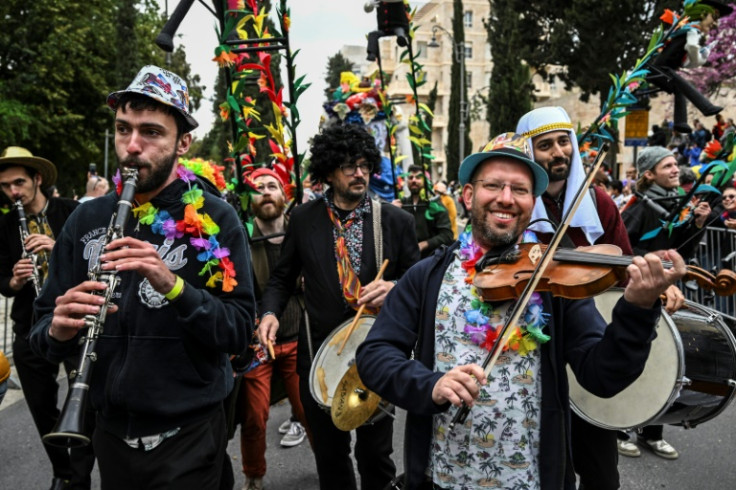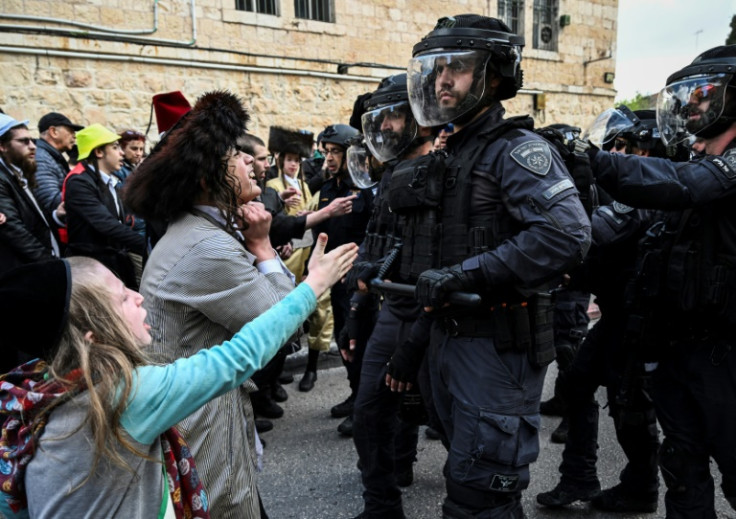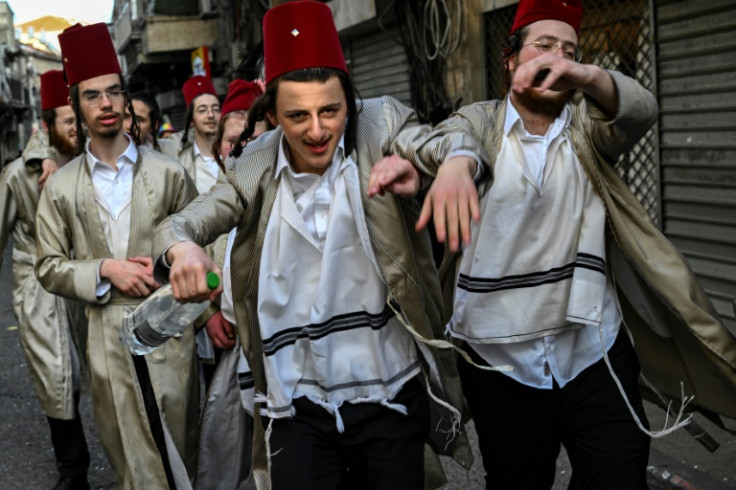Smiling Through Tears: Hostage Families Lead Jerusalem Purim Parade

It was meant to be a day of revelry and high jinks for Jews, but Jerusalem's Purim parade Monday struck a more sombre note, with some relatives of hostages held in Gaza even trying to stop it.
Sharon Kalderon, whose brother-in-law Ofer Kalderon,53, was kidnapped from the Nir Oz kibbutz community near Gaza during the October 7 attack by Hamas, first opposed the celebrations.
But then she and other relatives of the hostages agreed to lead it.
"We tried to cancel it, it didn't succeed. So we are here for them, reminding them we are in the front," she told AFP.
Purim celebrates the Jewish people's rescue from a Persian extermination plot recounted in the Bible's Book of Esther. It is traditionally marked with costumes, gift-giving and lots of alcohol.
This year, however, the often boisterous celebrations have been heavily toned down due to Israel's war with Hamas militants who are holding Israeli hostages in the Gaza Strip. Tel Aviv and its suburb Holon cancelled their parades.
Kalderon, who was dressed in black, like the other hostage families, said "this is an opportunity for us to remind the world, to remind everyone, this is the time to bring them back home. And then, we can continue whatever we want."
Militants seized 253 Israeli and foreign hostages during the October 7 Hamas attack on Israel that triggered the war and resulted in the deaths of around 1,160 people, mostly civilians, according to an AFP tally of official Israeli figures.
Israel believes around 130 captives remain in Gaza, including 33 presumed dead.
At least 32,333 people, most of them women and children, have been killed in Israel's military response to eliminate the Palestinian militant group, according to the health ministry in Hamas-run Gaza.
Many of those walking in the parade or watching from the sides of the streets in Jerusalem wore yellow ribbons on their wrists or coats in solidarity with the hostages.
Children in fancy dress also carried a giant inflatable ribbon.
With emotions running high, some relatives of hostages stopped and hugged onlookers.
Former Israeli president Reuven Rivlin, acknowledged "mixed feelings for the people of Israel" this year.
Jerusalem mayor Moshe Leon -- who had earlier defended his decision to go ahead with the procession -- wore a shirt in support of the hostages with the words, "Bring them home now" emblazoned on it.
He had argued that the parade was meant to "safeguard the emotional resilience of Israeli children and give them a place to celebrate in the complex reality we live in."
Deputy mayor Ariela Rejwan told AFP that the parade had been planned for more than a year, but changes had to be made after the war began.
After listening to the concerns of hostage families, it was decided to play quieter music and not to call the event an "adloyada", the madcap humorous gatherings usually held during Purim.
"After five months of terror, two years of corona(virus), we want the children to have the festival. They deserve it," Rejwan said.
But other Purim gatherings in the city were less restrained, with Ultra-Orthodox youths clashing with security forces after drinking binges in the Mea Sharim district.
The municipality last organised a Purim parade in 1982.
"Purim is something we have been celebrating for more than 2,500 years," Rivlin said. "We should continue our lives despite what happened on October 7," the former head of state argued.
Kobi Frig, the CEO of Jerusalem's Train Theater, welcomed the parade as something children needed this year.
"The children need hope, they need inspiration, they need culture. It's not OK for them to deal only with war," he told AFP.


© Copyright AFP 2024. All rights reserved.





















